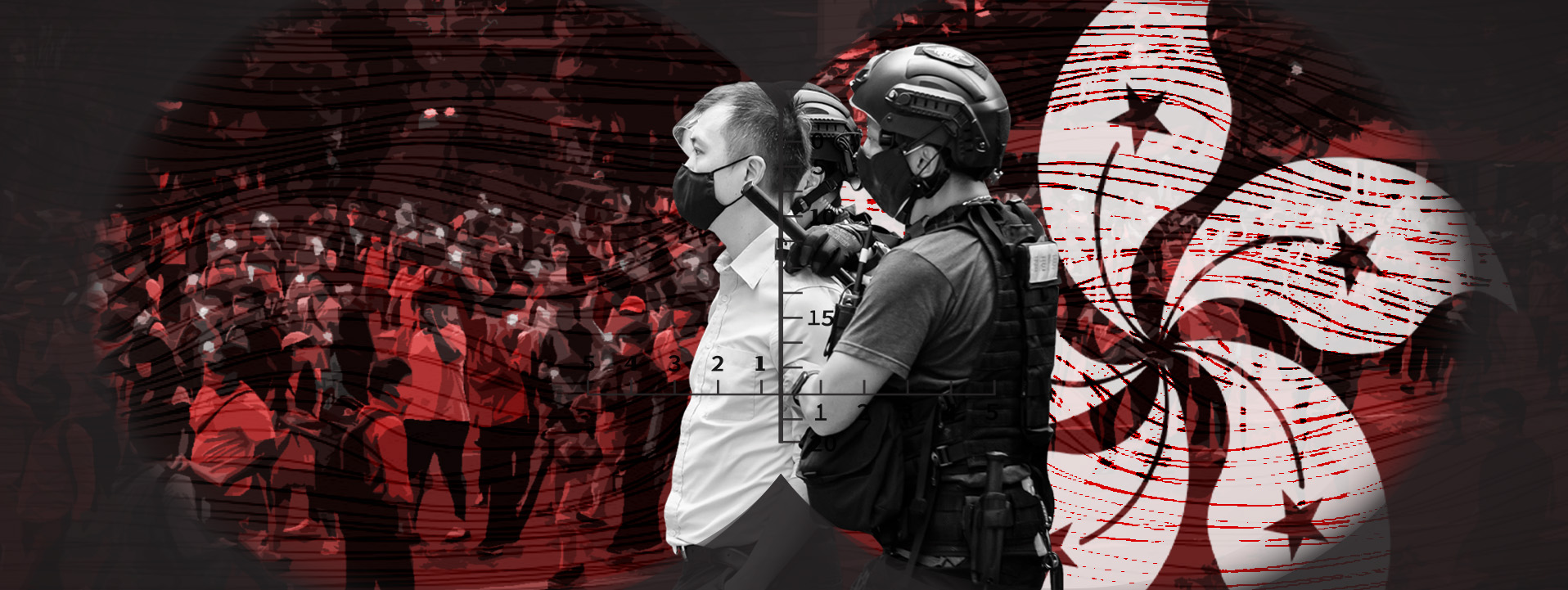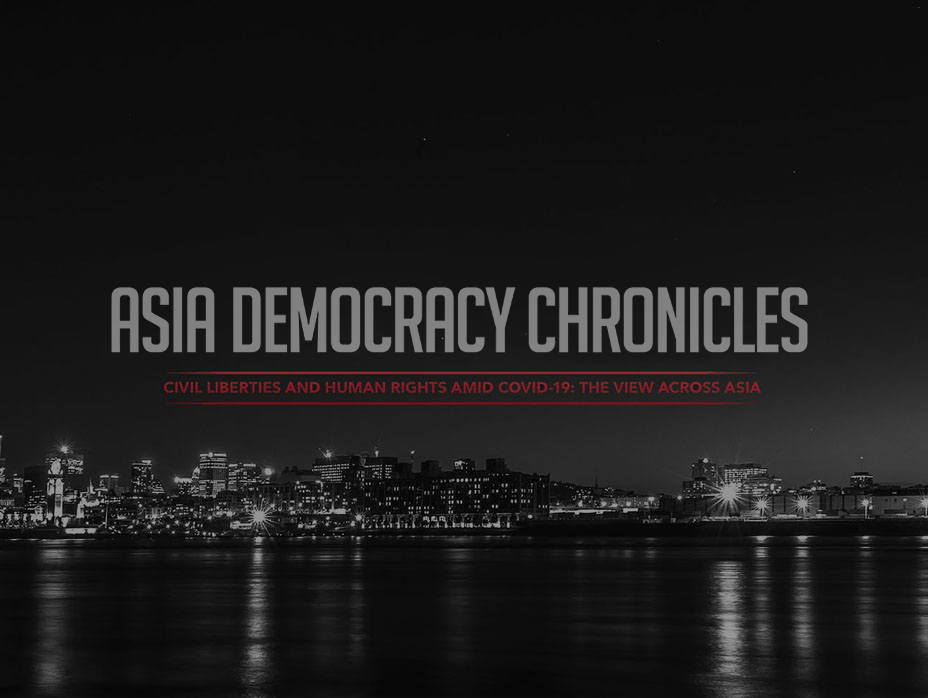Jin* was surprised when I asked if he was behind CHC*, a website dedicated to human rights issues in China. “How do you know?” he asked.
I could not really explain. Perhaps it was the fact that he often posted CHC news in various chat groups. Perhaps it was because he inadvertently revealed that he visited a detention center on his personal Facebook page. Perhaps it was because I met him years ago, before he knew it was better to conceal his identity and involvement.
This is the life of the new generation of Chinese human rights activists—anonymous, hidden from sight, isolated, and without a past. You do not mention your work to friends you know from school, past colleagues, or even family members. You pretend to live a parallel life in front of them. You use different pseudonyms when associating with different groups of people. You hide your real name from everyone, and with enough time you even forget it yourself. You regularly delete your footprints on social media, chat apps, and even your own devices. You work together with people whose names and identities you would not ask. You bear all the pressure and hurt from work all by yourself, not discussing them even with your own wife.
With the promulgation of the Hong Kong National Security Law, activists in Hong Kong are wondering if they may have to lead similar lives.
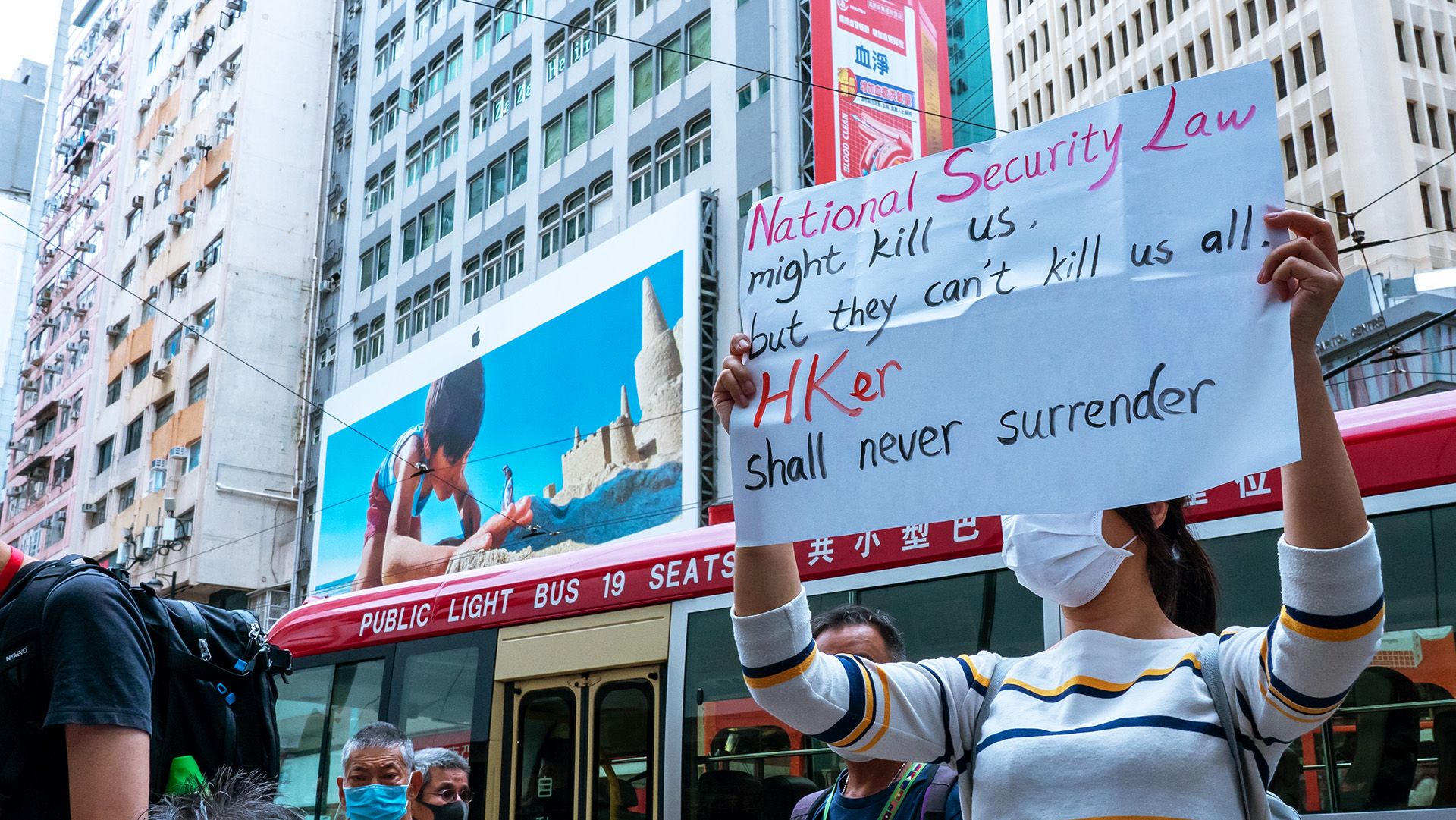
When China’s national security law was first proposed, the Hong Kong protesters came out in droves to oppose it in May. The law gives the authorities broad powers to investigate, prosecute, and punish dissenters.
Unfettered power
The situation was not always like this. Back in 2003, coined the “founding year of the right defense movement,” Chinese activists were able to publicly advocate for change, start campaign groups, and gain recognition in the process.
Even political demands and organizing were somewhat tolerated. In 2001, the late human rights advocate and Nobel Peace Prize laureate Liu Xiaobo founded the Independent Chinese Pen Center with the express aim of defending freedom of speech. From 2003 until its closure in 2009, the Open Constitution Initiative, a human rights organization, had campaigned for reform of the People’s Congress election system, and lawyers put themselves forward as independent candidates.
Activists in such movements and organizations openly spoke, networked, and campaigned, without feeling the need to hide their identities. Many activists became well-known public figures and took responsibility for what they said and did. There was suppression and retaliation, no doubt, but the government’s response was not so swift or so severe that it gave no space for activists to work.
Not anymore. Since Xi Jinping came into power, there has been a noticeable shift in how the government handles civil society. New laws that signal an ever-tightening squeeze were promulgated one after the other, including the National Security Law in 2015, the Charity Law in 2016, the Foreign NGO Law in 2016, and the Internet Security Law in 2016.
In 2013, the Criminal Procedure Law was amended. Among the changes was Article 73, which allows the authorities to impose “residential surveillance” in an undisclosed location for up to six months without access to a lawyer for those suspected of “crimes of endangering state security, terrorist activities, or especially serious bribery cases.”
Article 73 was immediately deployed to detain activists and human rights defenders. The once vocal media were largely shut down after the 2013 Southern Weekly controversy. Social media was censored and controlled much more closely, cutting off any possibilities of rights groups to communicate with the general public. A refined grid management system was imposed on the entire Chinese society, giving the government unfettered power to warn individuals away from “undesirable elements.” NGOs were left with a difficult choice: Submit to government control, or be shut down. And with the breakneck development of big data and surveillance technology, ever more precise control and management has become possible.
Lessons from an old handbook
In a sense, the Hong Kong security law is the Chinese government’s attempt to fast-track its long battle with the Chinese civil society and to distill its experience of control into one law. It is the Chinese National Security Law, Foreign NGO Law, Internet Security Law, and Criminal Procedure Law all rolled into one. It criminalizes speech on pain of life imprisonment. It gives police broad powers of questioning, search, and seizure. It empowers the authorities to censor Internet speech and control NGOs, the media, and foreign organizations. It opens up the possibility of the Chinese Criminal Procedure Law being applied to suspects in Hong Kong.
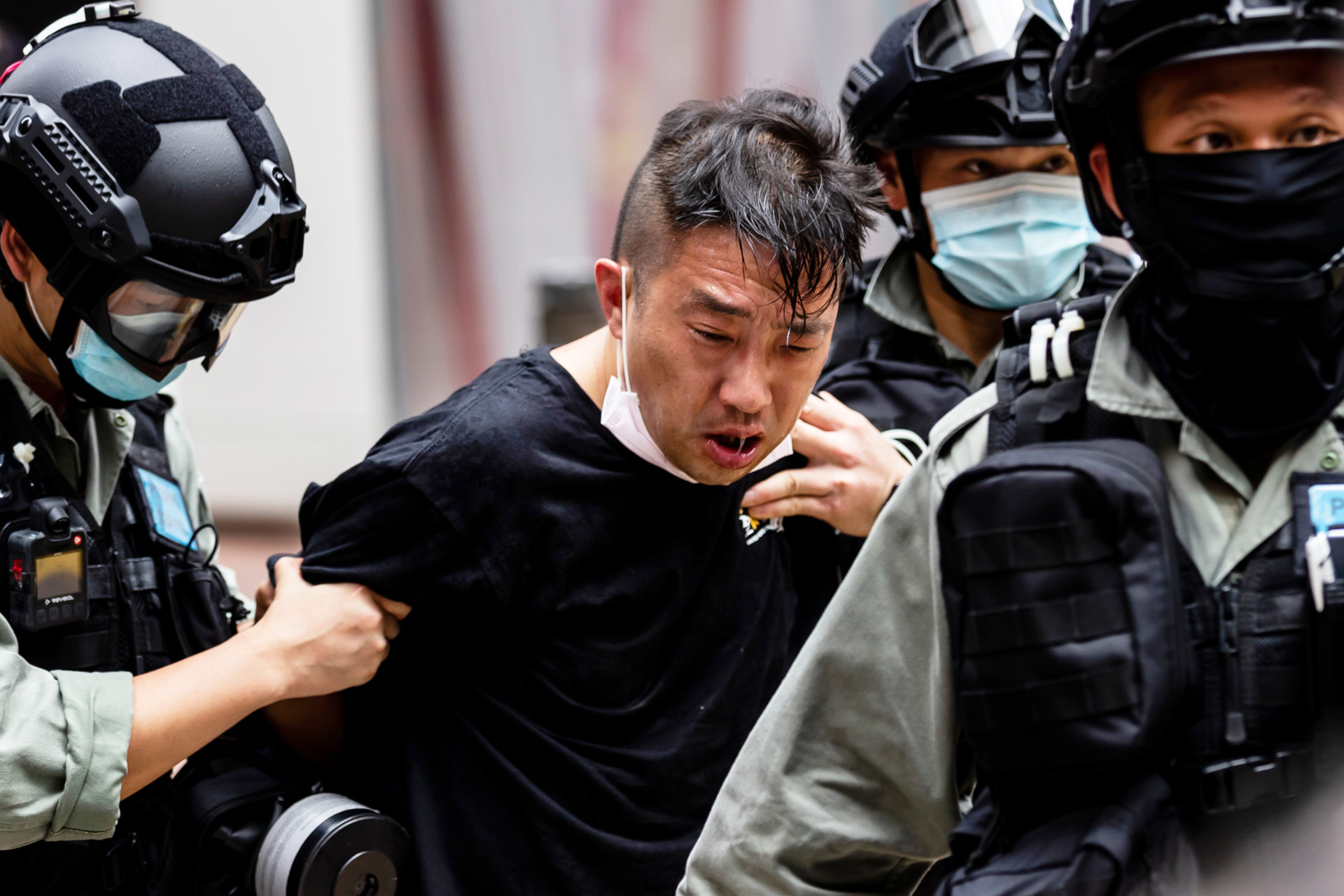
After China’s central government imposed the law over Hong Kong, protesters returned to the streets on July 1, 2020.
The law has instilled fear and panic in Hong Kong. Organizations disbanded and relocated. Activists have either withdrawn from the positions they had held in sensitive groups or gone into exile. Shops have torn down politically sensitive posters.
Those who have decided to stay in Hong Kong face the dilemma of how to continue their work. It was then that the experience of Chinese activists was suddenly rediscovered. Interest spiked in hearing and learning from Chinese activists who have been jailed or have dealt with national security agents. An old handbook on how to deal with police questioning, written by a Chinese activist currently in jail, was dug out and widely shared. Security training and gadgets that were traditionally geared towards the needs of mainland activists are now in high demand in Hong Kong.
Xie*, a young Chinese activist, recently shared his experiences with his Hong Kong counterparts. He offered advice on practices that could provide better protection for activists, such as compartmentalization of sensitive information, anonymity, and security protocols. He opined that the openness embraced by Hong Kong activists needs to change if the movement is to survive. However, this is but a minor adjustment. What Xie considers most important is for Hong Kong activists to learn from the pitfalls that they themselves have fallen into and avoid making the same mistakes.
“The most damaging impact of government suppression is the division and isolation of civil society groups,” said Xie. He explained that in order to survive, groups avoid discussing controversial topics and avoid contacting each other. However, when these groups cut off their connection, they also became much more vulnerable to government crackdown.
“The line of what is sensitive keeps on shifting, and shifts even faster when we are not united,” Yang* said. As a longtime dissident and commentator in China, Yang saw the depressing trend of civil society groups becoming more and more circumscribed in what they said and who they associated with.
“Prominent rights lawyers like Tang Jingling used to work together with labor NGOs campaigning on social issue such as fair wages. Now such collaboration is unthinkable. NGOs that work on less sensitive issues self-censored and distanced themselves from political issues or sensitive personalities,” he said. “They sought to find financial support from more official channels and cut off external links. Yet security bought with self-censorship is ephemeral. After those groups ‘disarmed’ themselves, they found the government coming after them. By then they don’t have the resources to fight back, and are left at the government’s mercy.”
A double-edged sword
Yang cited as an example the labor NGO crackdown in China in 2018 to 2019, during which over a hundred people were rounded up. Yet most activists stayed silent after the mass arrest, instead of appealing for external support. “They thought that by staying quiet, their families and friends would be released quicker,” he said.
“But each compromise adds up to a deafening silence in the whole society, where the government knows that it can trample on people’s rights at will. Secrecy breeds abuses, and we are empowering such abuses by our silence.”
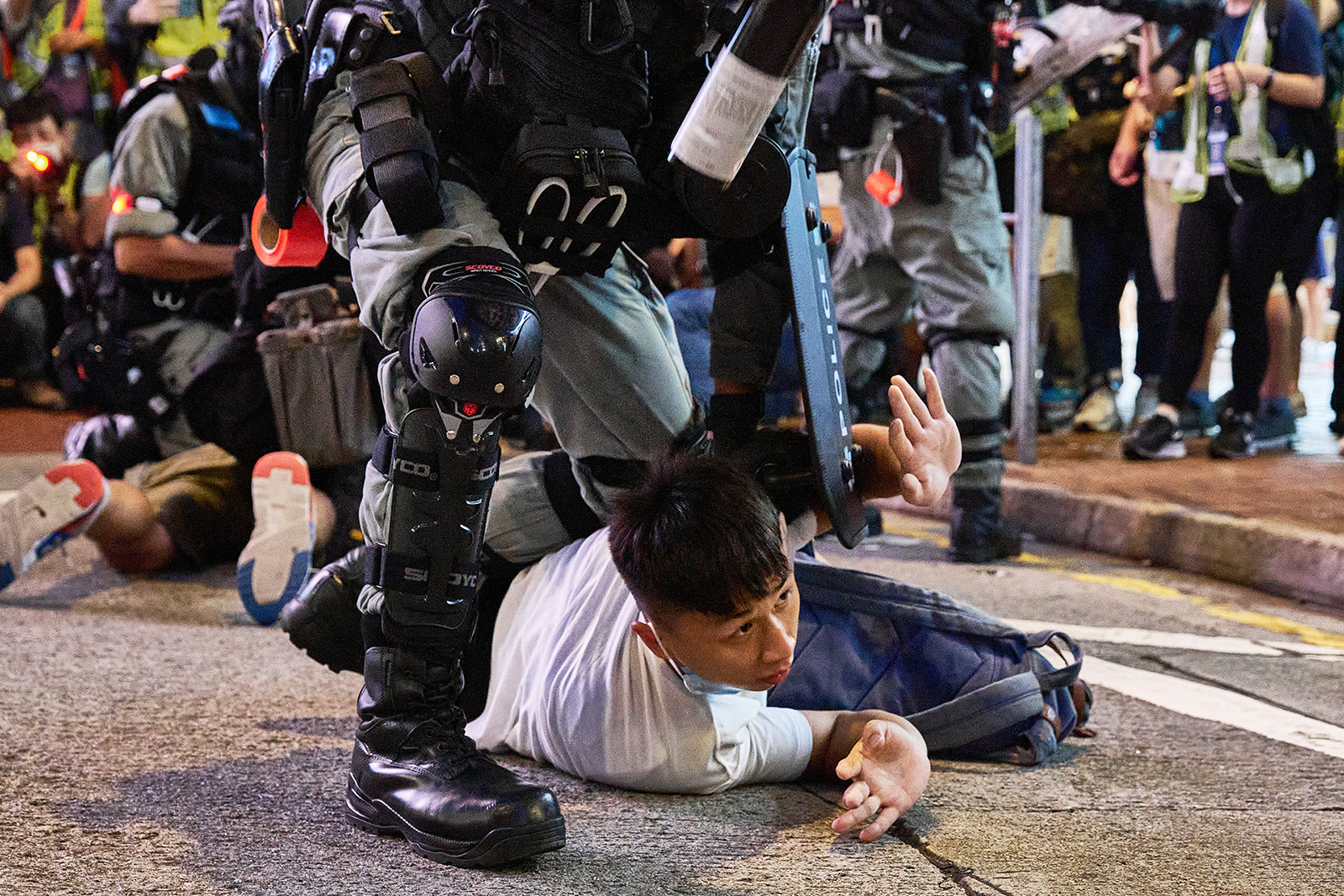
Pro-democracy advocates in Hong Kong are left with a difficult choice: Risk arrest, or go into exile.
“Another double-edged sword is going underground,” said Xie. This means that you will have no legitimate way of obtaining resources or recruiting new members. You will no longer be able to communicate with your base, and you will see your impact decrease day by day. You will rely mostly on trusted connections when you go underground, and such resources will dwindle with time. Sustainability will be a huge problem.
For Hong Kong activists, the critical question then is how to find that safe space in which to function without killing off the vitality of the movement. A division of labor is inevitable; some would take a lawful role and stay within the system, while others are bound to be sacrificed.
“Someone’s got to do it,” said Rick*. Though only in his 20s, he already has 10 charges hanging over his head for organizing protests in Hong Kong. He has come to accept that there may no longer be a lawful way of taking action, and if the movement needs someone to bear criminal responsibility, he is willing to be that person.
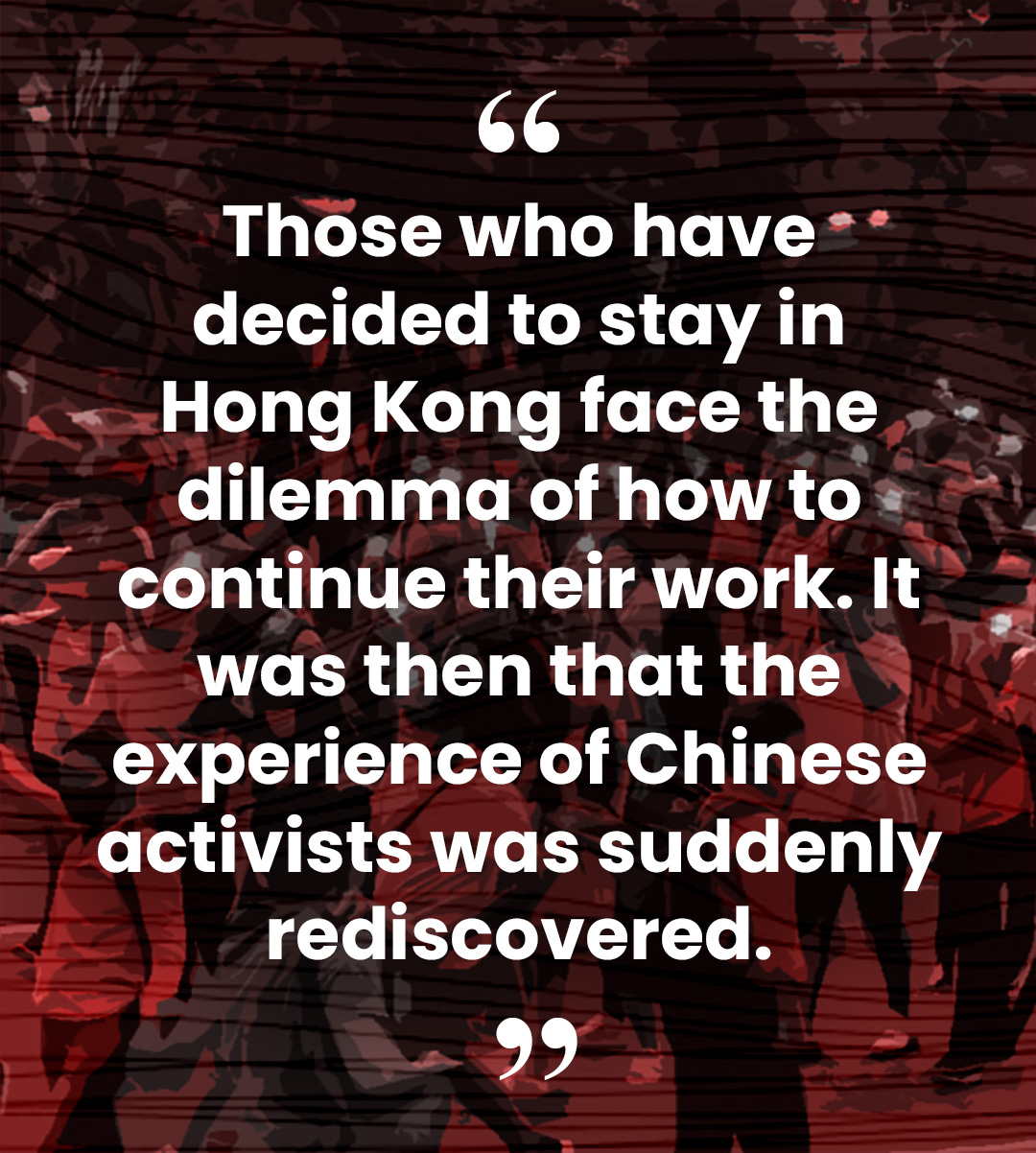 There is a tacit understanding among Rick and his colleagues. “Someone like my fellow activist John* is going to run for election and cannot take that role [of calling for unlawful action],” he said. “I, on the other hand, have little baggage. But whatever roles we take, we are in this together.”
There is a tacit understanding among Rick and his colleagues. “Someone like my fellow activist John* is going to run for election and cannot take that role [of calling for unlawful action],” he said. “I, on the other hand, have little baggage. But whatever roles we take, we are in this together.”
“There is no way we will stop calling for democracy, said Tim*. He leads one of the more political organizations in the city. “If they come for us, so be it.” At the same, he is preparing his organization for the coming storm through restructuring, security training, and crisis protocols. Their motto is “be prepared, but don’t back down.”
For Tim, Hong Kong’s strength lies in its much more vibrant civil society, which is used to fostering support across sectors and to mobilizing the masses. It will be much more difficult to put down compared to the nascent Chinese civil society. “It is important to keep making noise,” he says. “When public speech dies, so will the movement.”
The international character of the city could be another saving grace. “We have always positioned ourselves as part of an international movement,” said Kate*, a campaigner for women’s rights from Hong Kong who also has intimate knowledge of the state of feminist movement in China. “This link should be strengthened with the passing of the National Security Law, not given up.”
No illusions
Kate said she and her group needs the strength of being part of an international movement all the more since they are facing worsening suppression. “We also need to learn from and fight together with our peers inside mainland China, instead of submitting to the isolationist tendency of minding our own business,” she said. “We just have to be more careful about how to make those connections.”
People like Rick, Tim, and Kate harbor no illusions, however. They know that the rules have irrevocably changed. The fight is going to be much harder and the stakes incomparably higher. Security measures and tactical adaptation may reduce damage and buy time, but they cannot stop the state from going after you when it finds it politically expedient.
This is what happened to Jin. While Jin is one of the most security-savvy activists that I have ever met, with enough time, the government found enough clues about his work and identity. He soon found himself behind bars, charged with inciting subversion, and subjected to horrendous torture. Fortunately, the rounding up of CHC members did not lead to mass arrests, possibly because of the dearth of information the authorities could obtain from Jin. That may be the best one can hope for when the hammer falls.
An unjust law cannot dictate our action. We do. Whether or not we can stand our ground together will define the space we shall have in the coming years. ●
* Names have been changed to protect identities.
Hang Tung Chow is an activist and a barrister from Hong Kong.










